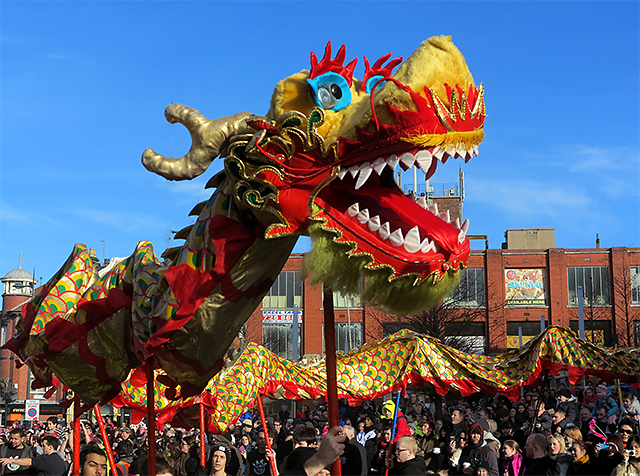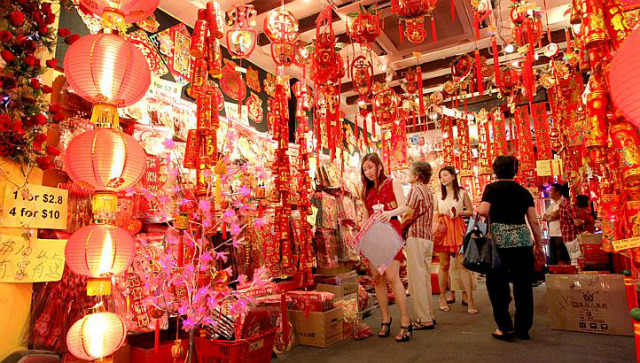
Preceding days
On the eighth day of the lunar month prior to Chinese New Year, a traditional porridge known as làbāzhōu (臘八粥) is served in remembrance “of an ancient festival, called Là, that occurred shortly after the winter solstice”.[12]Pickles such as La 8th garlic, which turns green from vinegar, are also made on this day. For those that believe in Buddhism, the La 8th (臘八) holiday is also considered Bodhi Day. Làyuè (臘月) is a term often associated with Chinese New Year as it refers to the sacrifices held in honor of the gods in the twelfth lunar month, hence the cured meats of Chinese New Year are known as làròu (臘肉). The porridge was prepared by the women of the household at first light, with the first bowl offered to the family’s ancestors and the household deities. Every member of the family was then served a bowl, with leftovers distributed to relatives and friends.[13] It’s still served as a special breakfast on this day in some Chinese homes. The concept of the ‘La month’ is similar to Advent in Christianity. Many families eat vegan on Chinese New Year eve, the garlic and preserved meat are eaten on Chinese New Year day.
On the days immediately before the New Year celebration, Chinese families give their home a thorough cleaning. There is a Cantonese saying “Wash away the dirt on ninyabaat” (年廿八,洗邋遢), but the practice is not restricted to nin’ya’baat (年廿八, the 28th day of month 12). It is believed the cleaning sweeps away the bad luck of the preceding year and makes their homes ready for good luck. Brooms and dust pans are put away on the first day so that the newly arrived good luck cannot be swept away. Some people give their homes, doors and window-frames a new coat of red paint; decorators and paper-hangers do a year-end rush of business prior to Chinese New Year.[14] Homes are often decorated with paper cutouts of Chinese auspicious phrases and couplets. Purchasing new clothing and shoes also symbolize a new start. Any hair cuts need to be completed before the New Year, as cutting hair on New Year is considered bad luck due to the homonymic nature of the word “hair” (fa) and the word for “prosperity”. Businesses are expected to pay off all the debts outstanding for the year before the new year eve, extending to debts of gratitude. Thus it is a common practice to send gifts and rice to close business associates, and extended family members.
In many households where Buddhism or Taoism is prevalent, home altars and statues are cleaned thoroughly, and altars that were adorned with decorations from the previous year are taken down and burned a week before the new year starts, to be replaced with new decorations. Taoists (and Buddhists to a lesser extent) will also “send gods” (送神, sòngshén), an example would be burning a paper effigy of Zao Jun the Kitchen God, the recorder of family functions. This is done so that the Kitchen God can report to the Jade Emperor of the family household’s transgressions and good deeds. Families often offer sweet foods (such as candy) in order to “bribe” the deities into reporting good things about the family.
Prior to the Reunion Dinner, a thanksgiving prayer offering to mark the safe passage of the previous year is held. Confucianists take the opportunity to remember the ancestors, and those who had lived before them are revered.
The biggest event of any Chinese New Year’s Eve is the Reunion Dinner,named as “Nian Ye Fan”. A dish consisting of fish will appear on the tables of Chinese families. It is for display for the New Year’s Eve dinner. This meal is comparable to Christmas dinner in the West. In northern China, it is customary to make dumplings (jiaozi, 餃子, jiǎozi) after dinner to eat around midnight. Dumplings symbolize wealth because their shape resembles a Chinese sycee. By contrast, in the South, it is customary to make a glutinous new year cake (niangao, 年糕, niángāo) and send pieces of it as gifts to relatives and friends in the coming days of the new year. Niángāo [Pinyin] literally means “new year cake” with a homophonous meaning of “increasingly prosperous year in year out”.[15] After dinner, some families go to local temples hours before the new year begins to pray for a prosperous new year by lighting the first incense of the year; however in modern practice, many households hold parties and even hold a countdown to the new year. Traditionally, firecrackers were once lit to scare away evil spirits with the household doors sealed, not to be reopened until the new morning in a ritual called “opening the door of fortune” (kāicáimén, 開財門).[16] Beginning in 1982, the CCTV New Year’s Gala was broadcast four hours before the start of the New Year.
First day
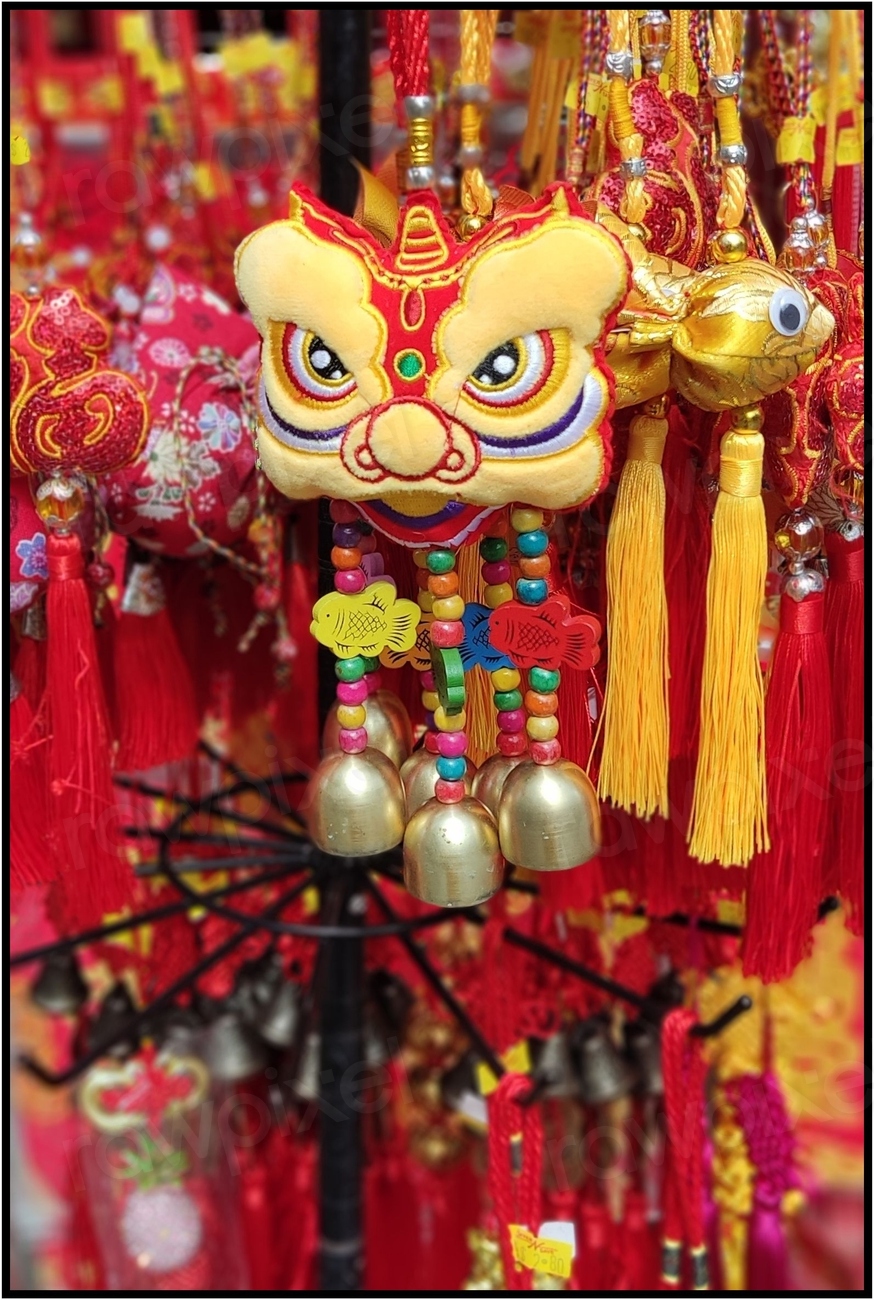
The first day is for the welcoming of the deities of the heavens and earth, officially beginning at midnight. It is a traditional practice to light fireworks, burn bamboo sticks and firecrackers and to make as much of a din as possible to chase off the evil spirits as encapsulated by nian (年) of which the term guo-nian (过年) was derived. Many people, especially Buddhists, abstain from meat consumption on the first day because it is believed that this will ensure longevity for them. Some consider lighting fires and using knives to be bad luck on New Year’s Day, so all food to be consumed is cooked the days before. On this day, it is considered bad luck to use the broom.
Most importantly, the first day of Chinese New Year is a time to honor one’s elders and families visit the oldest and most senior members of their extended families, usually their parents, grandparents and great-grandparents.
For Buddhists, the first day is also the birthday of Maitreya Bodhisattva (better known as the more familiar Budai Luohan), the Buddha-to-be. People also abstain from killing animals.
Some families may invite a lion dance troupe as a symbolic ritual to usher in the Chinese New Year as well as to evict bad spirits from the premises. Members of the family who are married also give red packets containing cash known as lai see or angpow, a form of blessings and to suppress the aging and challenges associated with the coming year, to junior members of the family, mostly children and teenagers. Business managers also give bonuses through red packets to employees for good luck, smooth-sailing, good health and wealth.
While fireworks and firecrackers are traditionally very popular, some regions have banned them due to concerns over fire hazards. For this reason, various city governments (e.g., Hong Kong, Beijing, for a number of years) issued bans over fireworks and firecrackers in certain precincts of the city. As a substitute, large-scale fireworks display have been launched by governments in such cities as Hong Kong and Singapore.
Second day
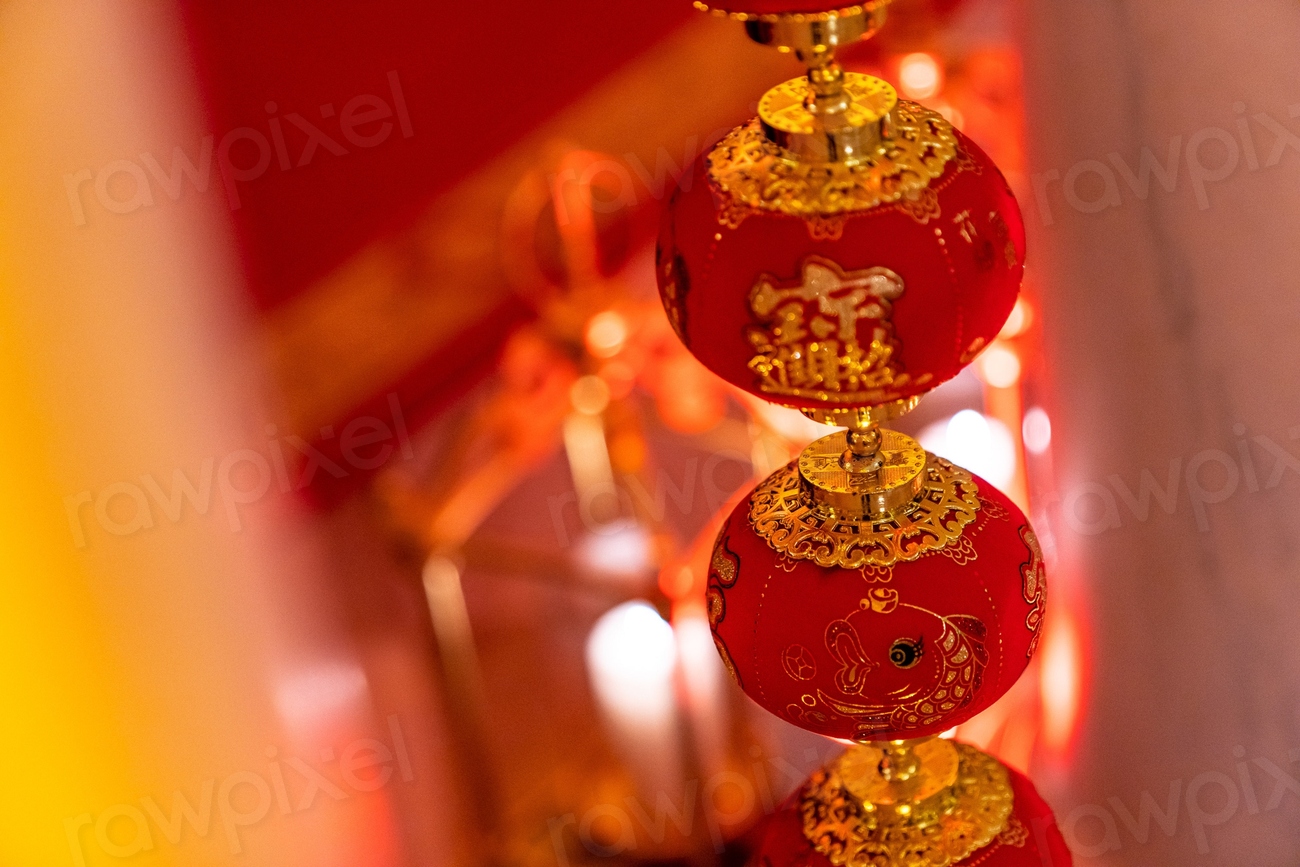
The second day of the Chinese New Year, known as kāinián (開年/开年, “beginning of the year”),[17] was when married daughters visited their birth parents, relatives and close friends. (Traditionally, married daughters didn’t have the opportunity to visit their birth families frequently.)
During the days of imperial China, “beggars and other unemployed people circulate[d] from family to family, carrying a picture [of the God of Wealth] shouting, “Cai Shen dao!” [The God of Wealth has come!].”[18] Householders would respond with “lucky money” to reward the messengers. Business people of the Cantonese dialect group will hold a ‘Hoi Nin’ prayer to start their business on the 2nd day of Chinese New Year so they will be blessed with good luck and prosperity in their business for the year.
As this day is believed to be the birthday of Che Kung, a deity worshipped in Hong Kong, worshippers go to Che Kung Temples to pray for his blessing. A representative from the government asks Che Kung about the city’s fortune through kau cim.
Some believe that the second day is also the birthday of all dogs and remember them with special treats.
Third day

The third day is known as Chìkǒu (赤口), directly translated as “red mouth”. Chìkǒu is also called Chìgǒurì (赤狗日), or “Chìgǒu’s Day”. Chìgǒu, literally “red dog”, is an epithet of “the God of Blazing Wrath” (熛怒之神). Rural villagers continue the tradition of burning paper offerings over trash fires. It is considered an unlucky day to have guests or go visiting.[19][20] Hakka villagers in rural Hong Kong in the 1960s called it the Day of the Poor Devil and believed everyone should stay at home.[21] This is also considered a propitious day to visit the temple of the God of Wealth and have one’s future told.
Fourth day
In those communities that celebrate Chinese New Year for only two or three days, the fourth day is when corporate “spring dinners” kick off and business returns to normal.
Fifth day
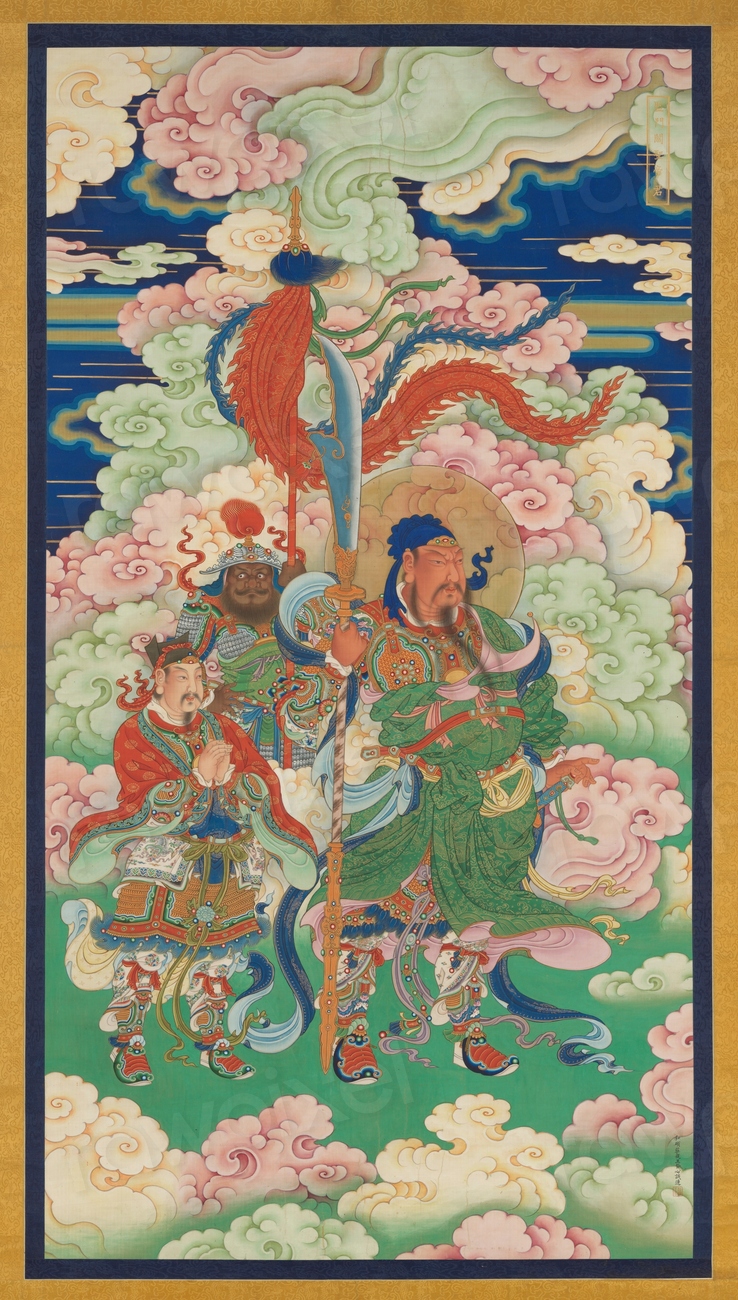
This day is the God of Wealth’s birthday. In northern China, people eat jiǎozi (simplified Chinese: 饺子; traditional Chinese: 餃子), or dumplings, on the morning of pòwǔ (破五). In Taiwan, businesses traditionally re-open on the next day (the sixth day), accompanied by firecrackers.
It is also common in China that on the 5th day people will shoot off firecrackers to get Guan Yu‘s attention, thus ensuring his favor and good fortune for the new year.[22]
Seventh day
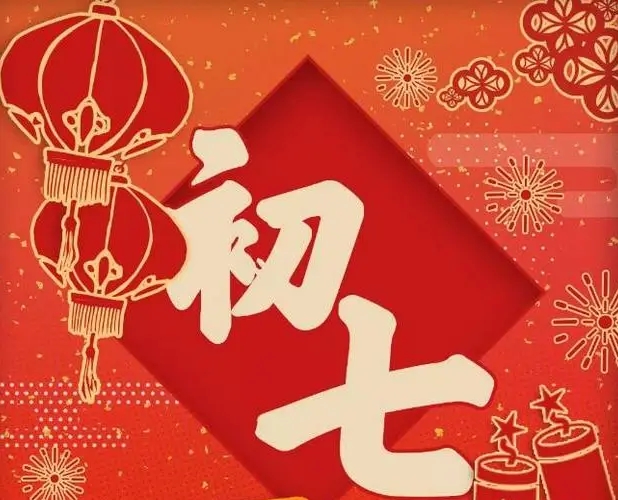
The seventh day, traditionally known as Rénrì (人日, the common person’s birthday), is the day when everyone grows one year older. In some overseas Chinese communities inSoutheast Asia, such as Malaysia and Singapore, it is also the day when tossed raw fish salad, yusheng, is eaten for continued wealth and prosperity.
For many Chinese Buddhists, this is another day to avoid meat, the seventh day commemorating the birth of Sakra, lord of the devas in Buddhist cosmology who is analogous to the Jade Emperor.
Eighth day
Another family dinner is held to celebrate the eve of the birth of the Jade Emperor, the ruler of heaven. People normally return to work by the eighth day.the Store owners will host a lunch/dinner with their employees, thanking their employees for the work they have done for the whole year.
Approaching 12 midnight on this day, Hokkien people prepare for a Jade Emperor ritual (Bai Ti Gong or 拜天公) during which incense is burnt and food offerings made to the Jade Emperor and also to Zao Jun, the Kitchen God who reports on each family to the Jade Emperor.
Some people will hold a ritual prayer at after midnight on the eighth day. In Malaysia, especially, people light fireworks, often more than on the first day.
This practice of Bai Ti Gong can also be seen in Singapore.
Ninth day
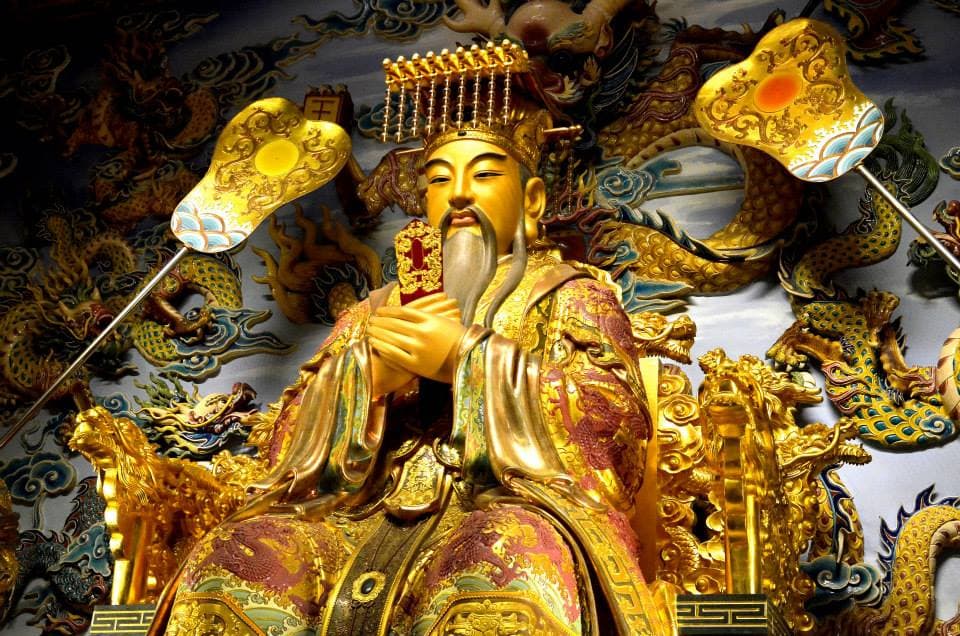
The ninth day of the New Year is a day for Chinese to offer prayers to the Jade Emperor of Heaven (天公, Tiāngōng) in the DaoistPantheon.[23] The ninth day is traditionally the birthday of the Jade Emperor. This day, called Ti Kong Dan, Tiangong Sheng (天公生) orPai Ti Kong (拜天公, Pài Thiⁿ-kong), is especially important to Hokkiens, even more important than the first day of the Chinese New Year.[24]
Come midnight of the eighth day of the new year, Hokkiens will offer thanks to the Emperor of Heaven. A prominent requisite offering issugarcane.[24] Legend holds that the Hokkien were spared from a massacre by Japanese pirates by hiding in a sugarcane plantation during the eighth and ninth days of the Chinese New Year, coinciding with the Jade Emperor’s birthday.[24] Since “sugarcane” (甘蔗, kam-chià) is a near homonym to “thank you” (感謝, kám-siā) in the Hokkien dialect, Hokkiens offer sugarcane on the eve of his birthday, symbolic of their gratitude.[24]
In the morning of this birthday, Taiwanese households set up an altar table with 3 layers: one top (containing offertories of six vegetables (六齋), noodles, fruits, cakes, tangyuan, vegetable bowls, and unripe betel, all decorated with paper lanterns) and two lower levels (containing the five sacrifices and wines) to honor the deities below the Jade Emperor.[23]The household then kneels three times and kowtows nine times to pay obeisance and wish him a long life.[23]
Incense, tea, fruit, vegetarian food or roast pig, and gold paper is served as a customary protocol for paying respect to an honored person.
Tenth day
The Jade Emperor’s party is also celebrated on this day.
Thirteenth day
On the 13th day people will eat pure vegetarian food to clean out their stomach due to consuming too much food over the preceding two weeks.
This day is dedicated to the General Guan Yu, also known as the Chinese God of War. Guan Yu was born in the Han dynasty and is considered the greatest general in Chinese history. He represents loyalty, strength, truth, and justice. According to history, he was tricked by the enemy and was beheaded.
Almost every organization and business in China will pray to Guan Yu on this day. Before his life ended, Guan Yu had won over one hundred battles and that is a goal that all businesses in China want to accomplish. In a way, people look at him as the God of Wealth or the God of Success.
Fifteenth day
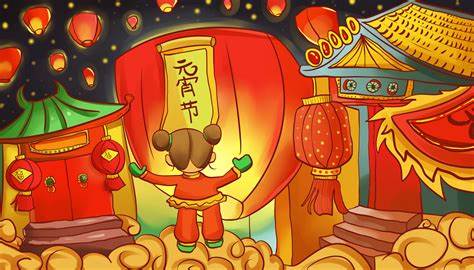
The fifteenth day of the new year is celebrated as Yuanxiao Festival/Yuánxiāojié (元宵節), also known as Shangyuan Festival/Shàngyuánjié (上元節) or the Lantern Festival (otherwise known as Chap Goh Mei Chinese: 十五暝; pinyin: Shíwǔmíng; literally “the fifteen night” in Fujian dialect). Rice dumplings tangyuan (simplified Chinese: 汤圆;traditional Chinese: 湯圓; pinyin: tāngyuán), a sweet glutinous rice ball brewed in a soup, are eaten this day. Candles are lit outside houses as a way to guide wayward spirits home. This day is celebrated as the Lantern Festival, and families walk the street carrying lighted lanterns.
In Malaysia and Singapore, this day is celebrated by individuals seeking for a love partner, a different version of Valentine’s Day.[25] Normally, single women would write their contact number on mandarin oranges and throw it in a river or a lake while single men would collect them and eat the oranges. The taste is an indication of their possible love: sweet represents a good fate while sour represents a bad fate.
This day often marks the end of the Chinese New Year festivities.
Taken from : http://en.wikipedia.org/wiki/Chinese_New_Year
updated06/02/24

